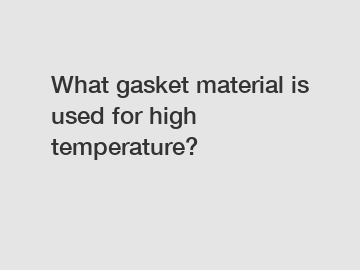Feb. 27, 2024
Rubber & Plastics
Goto WQRUBBER to know more.
Gaskets play a crucial role in ensuring a tight seal in high-temperature environments, where exposure to extreme heat can cause traditional materials to degrade and fail. When selecting a gasket material for high-temperature applications, it is essential to choose one that can withstand the elevated temperatures without compromising performance. In this article, we will explore the different gasket materials that are commonly used for high-temperature applications and their key characteristics.
Silicone Gaskets.

Silicone gaskets are a popular choice for high-temperature applications due to their excellent heat resistance. Silicone can withstand temperatures ranging from -60°C to 315°C, making it ideal for a variety of industrial applications where heat resistance is crucial. Silicone gaskets are also known for their flexibility, which allows them to conform to irregular surfaces and maintain a tight seal, even at high temperatures. Additionally, silicone gaskets are resistant to UV rays, ozone, and other environmental factors, making them suitable for outdoor applications.
Graphite Gaskets.
Graphite gaskets are another popular choice for high-temperature applications due to their exceptional heat resistance and sealing properties. Graphite can withstand temperatures up to 550°C in oxidizing environments, making it an ideal choice for high-temperature applications where other materials may fail. Graphite gaskets are also highly resistant to chemicals, making them suitable for use in corrosive environments. However, graphite gaskets can be brittle and may not be suitable for applications that require frequent disassembly and reassembly.
PTFE Gaskets.
PTFE (polytetrafluoroethylene) gaskets are widely used in high-temperature applications due to their excellent chemical resistance and high-temperature stability. PTFE can withstand temperatures up to 260°C, making it suitable for a wide range of industrial applications. PTFE gaskets are known for their low friction properties, which make them easy to install and remove without damaging the sealing surfaces. Additionally, PTFE gaskets are resistant to most chemicals, making them suitable for use in harsh environments where exposure to corrosive substances is a concern.
Ceramic Gaskets.
Ceramic gaskets are often used in extreme high-temperature applications where traditional gasket materials would fail. Ceramic gaskets can withstand temperatures up to 1,000°C, making them ideal for applications such as furnaces, boilers, and exhaust systems. Ceramic gaskets are highly resistant to thermal shock and are non-reactive to most chemicals, making them suitable for use in a variety of industrial applications. However, ceramic gaskets can be brittle and may require careful handling during installation to prevent breakage.
In conclusion, selecting the right gasket material for high-temperature applications is crucial to ensuring a reliable seal and preventing leaks or failures. Silicone, graphite, PTFE, and ceramic gaskets are all excellent choices for high-temperature applications, each offering unique characteristics that make them suitable for specific environments and operating conditions. By choosing the right gasket material for your application, you can ensure a tight seal and minimize the risk of downtime or equipment failure due to high temperatures.
If you have any questions about selecting the right gasket material for your high-temperature application, please feel free to contact us. Our team of experts is here to help you find the perfect solution for your sealing needs.
For more High Abrasion Resistance Nr Rubber Sheet for Saleinformation, please contact us. We will provide professional answers.
If you are interested in sending in a Guest Blogger Submission,welcome to write for us!
All Comments ( 0 )